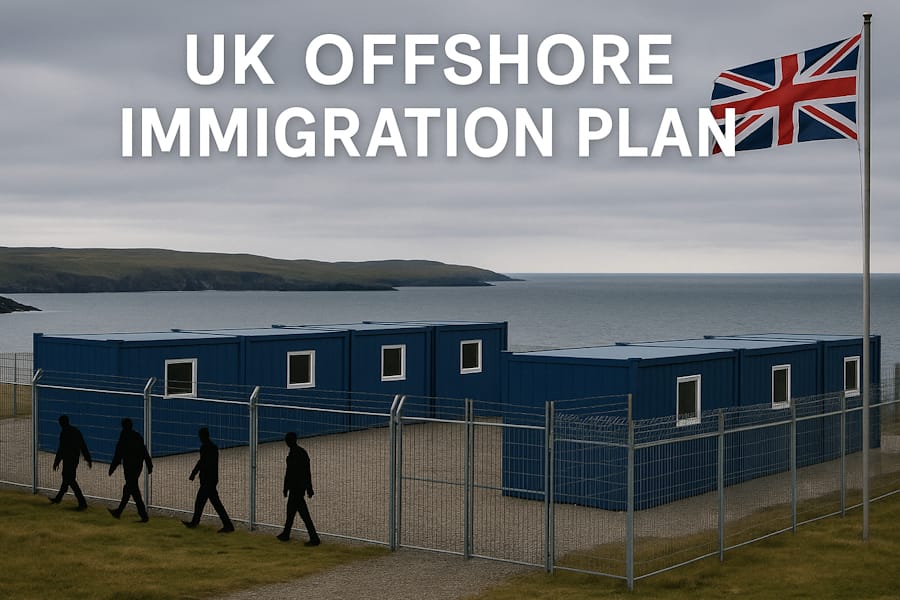Type: Article -> Category: UK Politics
Islands of Order
A New Plan to Fix UK Immigration Without Breaking the Law or the Bank

Publish Date: Last Updated: 12th January 2026
Author: nick smith- With the help of CHATGPT
Updated Introduction: The Stakes, the Numbers and the Unseen Drivers 31/10/2025
The scale of the challenge is now clearer than ever: more than 50,000 individuals have crossed into the UK in small boats since Labour came into office in July 2024. In the first six months of 2025 alone, arrivals reached nearly 20,000, a rise of approximately 48% compared with the same period in 2024. Meanwhile the cost burden on public services is mounting: the UK Parliament’s own briefing estimated that each unauthorised individual could cost the public around £12,000, meaning an informal population of 1.2 million could carry a fiscal burden of about £14.4 billion.
On the policy front, Labour has taken visible steps: the creation of a new Border Security Command to coordinate enforcement, and newly reported power to return illegal migrants to France under the UK‑France “one‑in, one‑out” treaty. The backlog of asylum applications has also fallen by 28% since Labour entered office.
Yet despite these moves, the core problem remains untouched: the economic, geopolitical and smuggling‑network drivers pushing tens of thousands into perilous crossings. Policies aimed at returns and enforcement do not directly confront:
- the pull‑factor of UK welfare and asylum incentives;
- the smugglers’ business model, which adapts faster than any policy;
- the root causes abroad—conflict, climate, poverty, that funnel people into the boats.
Until these root drives are addressed, mere enforcement risks remaining reactive rather than preventive. The question now is whether Britain can turn this moment of urgency into a strategy of lasting reform, one that reaches beyond headline figures to the structures generating the crisis.
Do we have strong enough politicians to tackle the real problems facing Britain?
Or will the next decade be defined by short-term slogans, legal limbo, and mounting costs quietly passed onto the public?
Immigration is one of the UK’s most pressing and politically sensitive issues, yet no government has decisively resolved it. Illegal Channel crossings reached 44,125 year ending March 2025, and record levels have been arriving over the last 6 months, costing the country nearly £8 million per day in housing, legal processing, and public services. Meanwhile, Britain’s national debt has surged to 96% of GDP, and confidence in the system is eroding on all sides, among voters, migrants, and communities alike.
Previous attempts, such as the Rwanda relocation deal, cancelled under legal scrutiny and international criticism. Others have failed due to political infighting or logistical chaos.
But what if there were a new path, one that is legally sound, financially effective, and morally defensible?
This article explores a bold new approach: an offshore processing model based on UK territory that could deter illegal crossings, slash costs, and restore public confidence, without violating human rights or international law.
It’s not about walls or slogans. It’s about strategy, integrity, and political courage.
The Cost of Doing Nothing
The humanitarian and political challenges of uncontrolled migration are often debated, but the financial cost is harder to ignore:
- £2.9 billion per year on hotel accommodation alone
- 70% of asylum claims are either refused or withdrawn
- Backlog of over 175,000 cases
- Processing delays stretch into years
- Local councils overwhelmed, public services stretched
These figures are unsustainable for any country, let alone one already running a structural deficit and experiencing widespread housing and service shortages.
The question is no longer if change is needed, but how to implement it both lawfully and effectively.
The Proposal: Offshore Processing on UK Soil
The new proposal avoids the legal pitfalls of third-country deportations by keeping processing within UK jurisdiction, using remote UK territories such as the Shetland Islands.
Key Features:
- Modular, humane processing camps on Shetland
- Capacity: 5,000 beds, expandable to 10,000 by 2028
- Strict limits: No access to mainland UK during processing
- Processing time: 6 months maximum
- Naval transport ensures secure, scalable logistics
- Children and pregnant women (10%) housed separately on the mainland
- Voluntary repatriation offered at all stages
The Economic Impact
A serious plan must save money, and this one does.
💰 Estimated Annual Savings:
- £2–3 billion compared to current hotel costs
- £2 billion from reduced crossings
- £0.5 billion from faster processing
- £0.5 billion in tax gains via 50,000 migrant jobs linked to retraining and rural employment programmes
💸 Startup Costs:
- £195 million/year for setup, staffing, and operations
- £100 million for camp construction
- £70 million operational costs
- £20 million for global deterrence campaign
- £5 million to monitor conditions and support NGOs
💼 Local Jobs:
- 500 new jobs on Shetland
- £15 million invested in local wages
- £10 million for infrastructure and tourism development
This results in a net reduction in borrowing of up to 2%, contributing to national fiscal stability and easing strain on taxpayers.
Deterrence Without Breaching Human Rights
Unlike the Rwanda plan, this strategy is designed to be fully compliant with the European Convention on Human Rights (ECHR) and UN Refugee protocols.
Key Legal Safeguards:
- No forced removals, voluntary return only
- Fast-track processing capped at 6 months
- Exemptions for vulnerable people (children, pregnant women)
- Independent NGO monitoring, legal aid via video, and medical support (1:50 ratio)
It mirrors Australia’s Pacific Solution in deterrence, without replicating the indefinite detention or third-country legal traps that drew global criticism.
Public Sentiment and Political Will
The UK public wants action, but not cruelty.
- 65% of Britons support tougher asylum policies (YouGov, 2024)
- Over 60% want fair and humane treatment upheld
- 75% believe immigration policy has been mismanaged for years
This proposal offers a path for cross-party cooperation, one that avoids the divisive, legally questionable tactics of past attempts.
It is a middle way: firm but fair, legal but effective.
Learning from Others: What Works
- Australia: Offshore processing cut illegal crossings by 90%, but indefinite detention damaged international reputation.
- Sweden: Cut costs via 6-month processing rules, clear asylum criteria, and rapid enforcement.
- Canada: Used remote centers and public-private partnerships, aligned with regional job creation efforts.
The UK’s model draws on all three, while remaining tailored to a population of 67 million, and the constraints of European human rights law.
A Realistic and Humane Future
This isn't a plan to “stop the boats” with bravado. It’s a plan to replace chaos with order, cost with control, and fear with fairness.
By processing claims offshore, yet within UK law, and making clear that unlawful crossings no longer guarantee entry, the UK can:
- Deter criminal smuggling networks
- Treat genuine refugees with dignity
- Prioritize national fiscal health
- Reduce political division through competence
Conclusion: The Real Test of Leadership
For decades, immigration policy has been Britain’s political minefield, dodged, delayed, and distorted.
But the real test of leadership is not to shout the loudest, but to govern the smartest.
This plan, offshore, lawful, humane, offers a route forward that neither abandons our principles nor ignores the public purse.
It’s time to stop managing symptoms and start solving root causes.
The public is ready. The question is: Are our politicians?
Epilogue: What Has This Got to Do with AI in the UK?
You might be wondering, what does immigration reform have to do with artificial intelligence?
The answer is this: AI can help us solve real problems.
This article was developed in collaboration with AI, not to generate headlines, but to explore legally sound, economically viable solutions to one of the UK’s most persistent challenges. AI didn’t invent the issue, but it helped research comparative models, test assumptions, run fiscal logic, and sharpen ideas with speed and clarity that might otherwise take months of committee reports and consultancy fees.
AI, when used responsibly, is a tool for problem-solving at scale, from policy design to legislative analysis, logistics planning, and public engagement. It’s not here to replace judgment or leadership, it’s here to strengthen them.
But tools mean nothing if there’s no will to use them.
Britain is under enormous pressure. From debt to housing, from health to migration, the cracks are widening. If we continue to let political parties treat every challenge as a campaign opportunity instead of a shared national responsibility, we will only accelerate decline.
That’s why it’s vital, now more than ever, for UK citizens to insist on more than promises. We must demand joined-up writing from any government, of any colour. We must push for cross-party cooperation on the big issues, because these problems affect us all, not just the poll numbers.
We don’t need more culture wars or tactical stalling.
We need courage, clarity, and cooperation.
And if we can combine that with the power of intelligent systems, Britain may still write its next chapter with purpose, and pride.
Latest UK Politics Articles
AI Questions and Answers section for Islands of Order: A New Plan to Fix UK Immigration Without Breaking the Law or the Bank
Welcome to a new feature where you can interact with our AI called Jeannie. You can ask her anything relating to this article. If this feature is available, you should see a small genie lamp above this text. Click on the lamp to start a chat or view the following questions that Jeannie has answered relating to Islands of Order: A New Plan to Fix UK Immigration Without Breaking the Law or the Bank.
Be the first to ask our Jeannie AI a question about this article
Look for the gold latern at the bottom right of your screen and click on it to enable Jeannie AI Chat.
Type: Article -> Category: UK Politics






